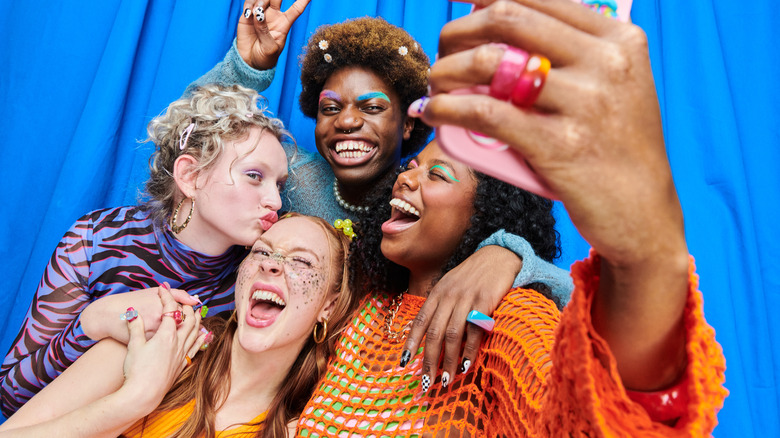What Does It Mean To Be Abrosexual? Here's Everything You Need To Know
Sexuality and gender both exist on a spectrum, with individuals having more terms than ever to describe their orientations and identities. Many members of the LGBTQ+ community find that they identify with terms like lesbian, gay, or pansexual, but some individuals find their sexuality is more fluid. This is where the term abrosexual, also known as sexual fluidity, comes in — a sexuality that is becoming more widely known and accepted. "Abrosexual is a fluctuating sexuality," Indigo Stray Conger, certified family, couple, and sex therapist, told Women's Health. "It fluctuates significantly over time, both in who you might be attracted to in terms of gender, and also how much you're interested in sexual activity with or without a partner."
The label is derived from the Greek word "abro," which means graceful, delicate, or dainty, and signifies the fluid nature of sexuality. It's unknown exactly when the term came into existence, but it's believed to have originated from DeviantArt in 2013, with the abrosexual flag being created by Tumblr user Mod Chad in 2015 upon an anonymous request. If you feel like abrosexuality might be something you identify with, here's everything you need to know about the identity.
How does abrosexuality compare to other sexualities?
Many people will find that their sexual orientation and identities are unchanging. While people who identify as bisexual or pansexual, two distinct orientations, might find that they experience varying levels of attraction to different genders, their labels may remain the same over time. In contrast, people who are abrosexual can resonate with different identities at different points in their lifetime or simply identify with the term abrosexual to express sexual fluidity. "[Abrosexuality] changes pretty significantly," Indigo Stray Conger said. "It's really about a relational issue; it's about an intrinsic feeling in your body of what awakens attraction within you."
This sexuality is sometimes considered part of the asexuality spectrum, with asexual individuals experiencing little to no sexual attraction. Abrosexual individuals might find their attraction levels fluctuating between asexual, demisexual, and allosexual. If you're unfamiliar, demisexuality is when individuals don't feel sexual attraction without a close, intimate connection, while allosexuality is used to describe being sexually attracted to people. Similarly, abrosexual individuals might experience varying levels of romantic attraction over time, potentially identifying as aromantic or alloromantic.
Signs that you might be abrosexual
It can be challenging to know if you're abrosexual, especially since the term isn't as widely used as some other LGBTQ+ labels. Still, experts have identified a few experiences that can potentially point to abrosexuality. "It might feel like you're coming out all the time, because your sexuality is shifting," Adam Baldowski, PhD, MA, LMHC told Verywell Mind. This can be a difficult phenomenon to experience, especially if an individual doesn't realize that they're abrosexual. "Before learning about abrosexuality, I felt lost, as if out at sea," journalist Emma Flint wrote for Metro. "I also felt like a fraud because of how much I changed my identity when chatting with loved ones."
It's important to remember that fluctuating orientation and attraction is a normal and valid part of this identity, though individuals may face internal or external doubts. "Something that abrosexuals experience is questioning the authenticity of their identity because it's not as well-known," Baldowski explained. In practice, abrosexuality can look different across individuals, with some identifying with different labels across various time frames. How abrosexual individuals approach romantic relationships can also vary, with some deciding to forgo long-term relationships while others find themselves with lifelong partners.


